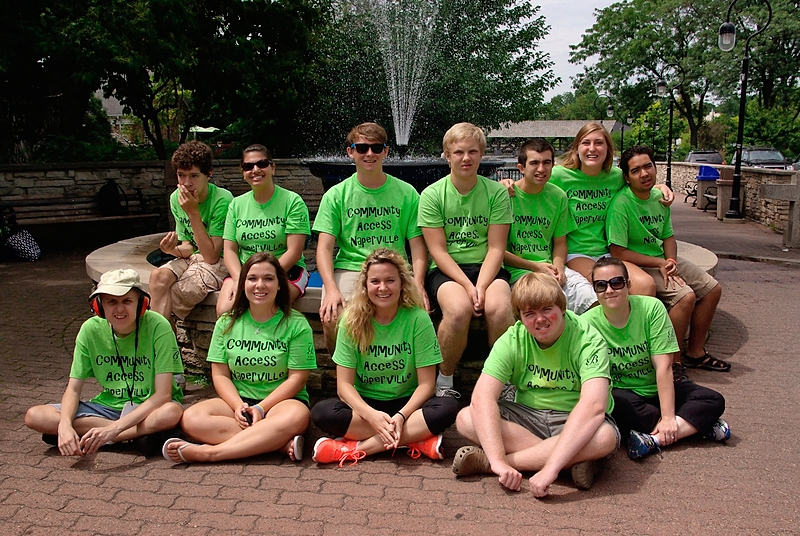CAN-Do Attitude
By Julie Duffin
June 2019 View more Humanitarian

When you’re out and about in downtown Naperville, you may notice a group of people wearing bright green shirts. Most likely the group is from Community Access Naperville, a local nonprofit that empowers people with intellectual and developmental disabilities to work in, contribute to, and enjoy their community.
CAN is the brainchild of six families who wanted to offer their adult children with disabilities something more during the summer. What began as a weeklong camp nine years ago has now grown into a weekly program with meaningful and safe activities.
Sherry Healey, one of the founding members the program, currently serves as its board president. “From the beginning we wanted to incorporate four components: vocational, recreational, community participation, and neurotypical peer interaction,” she states. Her son Michael, now 25, attends CAN three days a week. “The staff support, consistency, and community engagement works really well for him. It’s been a fantastic journey that has not only benefited our kids, but others in the community as well.”
Healey says CAN fills a specific niche for young adults who age out of school programs when they turn 22 years old. While most licensed, community-based programs offer a 1:6 staff-to-participant ratio, CAN has a 1-to-3 ratio. This enables them to support those who need a little extra help but can still be safe in the community. (Due to the nature of their activities, participants must be able to climb stairs and walk up to a mile.) Each session is run by professional program leaders and has a maximum of six participants. The nonprofit also offers internships and volunteer opportunities for local college students.
One of the main focuses of the group is to help other area residents. Participants volunteer at a variety of locations such as the Naperville library, the Naperville Police Department, West Suburban Food Pantry, and Sharing Connections. “We have great partnerships where our participants can really be productive and contribute to the community,” Healey states. Most recently CAN began partnering with the pediatric units at Edward and Good Samaritan Hospitals. The group recycles used crayons into new “super crayons” that come in a variety of fun shapes. “It’s a great outing because we get to help sick kids in the hospital and then we go out to lunch,” she says.
Based in downtown Naperville, the group gets out and walks around as much as possible. Healey gratefully points out how welcoming and supportive Naperville restaurants and businesses have been to the group. She highlights one particular occasion when the group was eating at Q-BBQ and two customers complained to the staff about them. The staff quickly responded that the CAN group was always welcome at the restaurant and then apologized to the group for the women’s comments. A couple of weeks later, the same women were dining again, and this time didn’t complain.
“I think that’s such an important piece of what we are doing—giving people with disabilities the opportunity to be out … and giving the community an opportunity to get to know them,” Healey explains.
To help support their activities, the group sells its super crayons, handmade prayer beads, and rosaries on its website. CAN collects used crayons in June and September at all three Naperville library locations. The nonprofit also hosts an annual fall fundraiser.
Those interested in partnering with or participating in the program are welcome to contact leaders through the website, communityaccessnaperville.org.
Photos Courtesy Community Access Naperville


